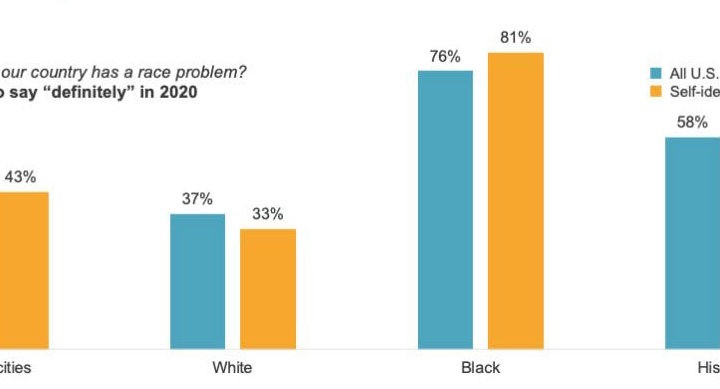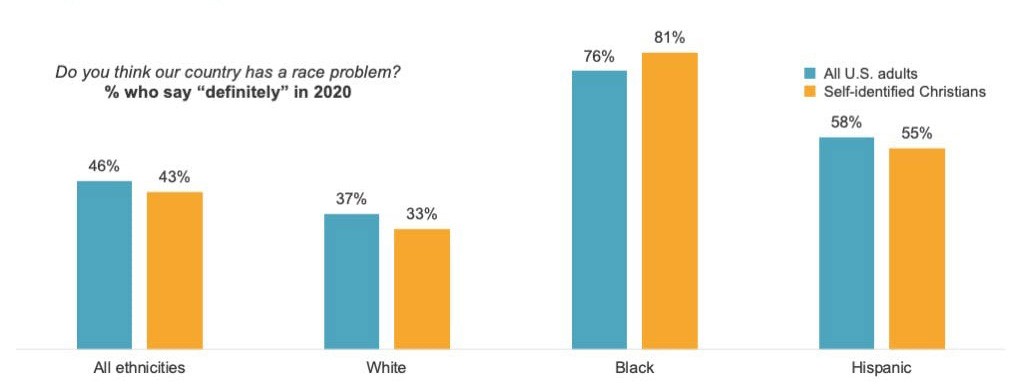Months of America’s so-called “racial reckoning” appear to have changed little in the perceptions of a majority of Christian worshipers, according to new data from Barna Research.
Comparing attitudes from July 2019 to July 2020, Barna found that “practicing Christians” — a term defined as “self-identified Christians who say their faith is very important in their lives and have attended a worship service within the past month” — have become less likely to acknowledge that race is a current problem in the United States.
The percentage of practicing Christians who believe race is “not at all” a problem in the U.S. actually increased year-to-year — from 11% in 2019 to 19% in 2020.
In July 2019, only 46% of practicing Christians said America “definitely” has a race problem — slightly below the 51% of all Americans who saw this as true. One year later, despite the high-profile police killings of Black citizens and months of protests, only 43% of practicing Christians said America “definitely” has a race problem.
The gap in perception between white Christians and Black Christians is enormous.
In fact, among Black Americans, identifying as a Christian increases the likelihood of believing America “definitely” has a race problem. Among Black Christians 81% said this is so — up from 75% a year earlier.
But among white practicing Christians in 2020, only 33% said America “definitely” has a race problem — down from 40% the year before. Amidst the spring and summer of racial protests and constant attention, white Christians dropped 7 percentage points in their acknowledgement of racial injustice.
Being a Black Christian doubles the likelihood that you will see race relations as a problem, compared to being a white Christian.
Being a Black Christian doubles the likelihood that you will see race relations as a problem, compared to being a white Christian, the survey found.
Meanwhile, the percentage of Americans who say they are motivated to address racial injustice has shrunk over the past year. In 2019, Barna found 11% of American adults were “unmotivated” to address racial injustice and another 9% were “not at all motivated” — a combined total of 20% of the population unwilling to engage in addressing racial injustices. This year, that combined total of the unmotivated increased to 28% — a 7-point uptick.
Among self-identified Christians, the gap grew even wider, shifting from 19% unmotivated in 2019 to 30% unmotivated in 2020. Barna highlights this point in bold print in its report: “In one year, that’s more than an 11 percentage point increase overall in Christians who are uninspired to address racial injustice.”
Again, white self-identified Christians skew the national averages higher, compared to the views of non-white Christians. More than one-third of white Christians (36%) said they lack motivation to address racial injustice, and another 9% said they are not sure how they feel. Taken together, that is nearly one-half of white Christians unwilling to address the issue that has dominated headlines all summer.
The situation shifts dramatically when viewed by generations, however. Christian Millennials and Christian Gen-Zers are far more likely to report motivation to address racial injustice.
Also, Christian Boomers are nearly twice as likely as Christian Millennials and Gen-Zers to believe they can “make a difference in ending racism,” the study found.
Barna asked a number of other questions about support for Black Lives Matter protests, where Americans are getting their information and their beliefs about certain phrases used in social justice communications.
The survey also asked who Americans believe should step up as leaders on issues of racial justice. Here, Barna’s report has a message for pastors and other religious leaders: “Regarding this racial justice education Christians say they desire, now is a key time for pastors and church leaders to provide guidance, support and teaching.”
“Regarding this racial justice education Christians say they desire, now is a key time for pastors and church leaders to provide guidance, support and teaching.”
“Self-identified Christians highly regard religious leadership right now — both as voices they are already listening to (17%) and as leaders they need to step up (16%).”
The report then adds: “Christians are also hoping to see political leaders step up in the area of racial justice — their governor (20%), national (16%) and local (17%) civic leaders and especially the president (34%).”
When asked who they believe should “step up as a leader regarding racial justice,” the most common answer given by self-identified Christians was “the president.”
Barna’s latest survey included responses from 1,525 U.S. adults between June 18 and July 6, 2020. The margin of error is plus or minus 1.8 at a 95% confidence interval.
Related articles:
We can’t talk about racial justice without addressing the ‘value gap’
In Louisville, learning as a white witness in Black space
Juneteenth should remind us of all the things we don’t know
Ahmaud, Breonna, Christian, George, and The Talk every black boy receives


